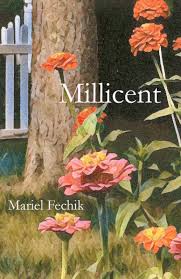ISSN: 1941-4137
POETRY THAT ENACTS THE ARTISTIC AND CREATIVE PURITY OF GLASS
POETRY THAT ENACTS THE ARTISTIC AND CREATIVE PURITY OF GLASS

Cody Stetzel received his MA in Creative Writing in poetry from the University of California at Davis. While from Rochester, New York, the former upstate & northeast hermit has replaced his slow-moving winter energies with the vitality of the west coast. His work has appeared in The East Coast Literary Review and Neovox: International.
October 8, 2019
Edited by Stephanie Kaylor
Edited by Stephanie Kaylor
Matrilineal: Review of Millicent by Mariel Fechik
 Millicent
by Mariel Fechik
Ghost City Press, 2019
With stinging nettles such as, “Grief slithers in and out of our ears, only frightened / away by singing,” or,
I took yellow streetlamps
into my chest,
house their light
until it, too, flickered
out
Mariel Fechik writes an enchanting lyric of dampening. Her chapbook, Millicent (Ghost City Press, 2019), is not a simple exercise in navigating sorrow, but instead a nonlinear architecture of grief, recourse, and promise in each of their assorted temporalities. I couldn’t help but think of Woolf’s To The Lighthouse while reading Millicent; the moodiness, the intimacy and residual affect of the sea, and the family being sought after all painted a visual throughout reading akin to what I imagined must have been running amok in Woolf’s mind while detailing all those passages along the water’s face.
The poetics of Fechik’s Millicent are a twofold anatomy: of color and maternal lineage. Through the stunning chapbook, Fechik draws a multi-generational history of matricide with the guidance of a color spectrum; in Millicent we read references and allusions to landscapes of greens, blues, reds, oranges, and violets. While typically denoting color is not a miraculous work, here the color is the primary referent - the signifier for the scene being played out in which we peer to find the poem. Fechik carefully subverts the expectation of a scene or memory by making its primary definition one so psychological in nature.
I enjoyed tracking the transformation of blue-greens to red and yellow, but more than that, the chapbook was incredible at instructing me how to put to words that oftentimes unconscious association between feeling and color. Whether they are “bluegreen leftovers of / the Atlantic,” or, “…western Montana: / a smear of stone, blue and green and avalanche,” each application of color added a new hierarchy of codification to the ensemble of meaning and poem. Blue and green were not simply landmarks of desolation, but became significant markers of a complicated sadness: one wherein there is life, and there is living.
In Mary Ruti’s A World of Fragile Things, a wonderful collection of essays entangled with the creative urge and grief, Ruti writes,
Millicent
by Mariel Fechik
Ghost City Press, 2019
With stinging nettles such as, “Grief slithers in and out of our ears, only frightened / away by singing,” or,
I took yellow streetlamps
into my chest,
house their light
until it, too, flickered
out
Mariel Fechik writes an enchanting lyric of dampening. Her chapbook, Millicent (Ghost City Press, 2019), is not a simple exercise in navigating sorrow, but instead a nonlinear architecture of grief, recourse, and promise in each of their assorted temporalities. I couldn’t help but think of Woolf’s To The Lighthouse while reading Millicent; the moodiness, the intimacy and residual affect of the sea, and the family being sought after all painted a visual throughout reading akin to what I imagined must have been running amok in Woolf’s mind while detailing all those passages along the water’s face.
The poetics of Fechik’s Millicent are a twofold anatomy: of color and maternal lineage. Through the stunning chapbook, Fechik draws a multi-generational history of matricide with the guidance of a color spectrum; in Millicent we read references and allusions to landscapes of greens, blues, reds, oranges, and violets. While typically denoting color is not a miraculous work, here the color is the primary referent - the signifier for the scene being played out in which we peer to find the poem. Fechik carefully subverts the expectation of a scene or memory by making its primary definition one so psychological in nature.
I enjoyed tracking the transformation of blue-greens to red and yellow, but more than that, the chapbook was incredible at instructing me how to put to words that oftentimes unconscious association between feeling and color. Whether they are “bluegreen leftovers of / the Atlantic,” or, “…western Montana: / a smear of stone, blue and green and avalanche,” each application of color added a new hierarchy of codification to the ensemble of meaning and poem. Blue and green were not simply landmarks of desolation, but became significant markers of a complicated sadness: one wherein there is life, and there is living.
In Mary Ruti’s A World of Fragile Things, a wonderful collection of essays entangled with the creative urge and grief, Ruti writes,…creativity possesses the power to mute the sharpness of loss by weaving a protective veil of symbols and signifiers around the raw wounds of absence. That is, creativity might enable us to move from a futile faithfulness to fractured interpersonal alliances to a more sublimated form of recollection and remembrance whereby lost objects — or perhaps even more significantly, the very concept of loss itself — are gathered within the pleats of our imaginative undertakings. From this perspective, creativity is a means of diffusing and managing loss, of transforming it into something that we can tolerate and live through, and, in the long run, perhaps even use as a basis for new life.
I felt this transformation of loss was what was at play within Millicent most vibrantly. Many of the poems in Fechik’s collection are of moms and grandmothers, even the dedication is to her grandmother. In her poems I read of a world that, at first, was full of visuals and landscapes that served only as reminders of the grief from absence and loss. As each poem complicated this nature, I found these environments being revisited, the colors being reintroduced, with more meaning tacked onto the initial and foundational loss. When I read the line, “My mother and I bake a tart, / all citrus, sugar, and quiet,” after reading a majority of these poems, I had goosebumps considering the implications of that solace.
Let this quiet continuation agree, let the tart be savored after.
Visit Ghost City Press' Website
Glass: A Journal of Poetry is published monthly by Glass Poetry Press.
All contents © the author.
All contents © the author.





